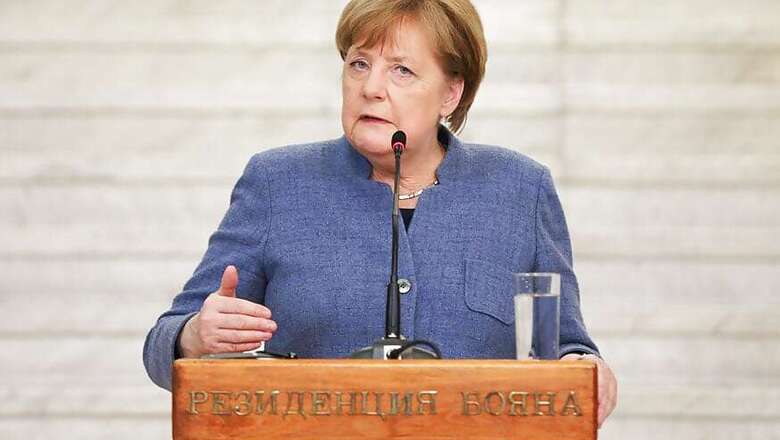
views
Berlin: Chancellor Angela Merkel warned on Saturday that Germany's top parties still had "very serious differences" to overcome ahead of next week's deadline for sealing a coalition deal.
Heading into what she called the "decisive phase of the negotiations" on a new right-left "grand coalition", Merkel said her conservatives and the Social Democrats (SPD) would have to haggle down to the wire.
"There is still a whole range of very serious differences — we have an enormous amount of work ahead of us," she said in reference to policies on refugees, the labour market and health insurance.
"I hope we will succeed but the problems are, as I said, not yet solved."
Germany has been in political limbo since a September 24 election in which Merkel failed to win a clear majority, in part due to the rise of the anti-immigration Alternative for Germany (AfD) which took millions of votes from all major parties.
Merkel initially turned to two smaller parties, the Free Democrats and Greens, to form a new coalition government for her fourth term. But when those talks collapsed in November, she had to once more woo a reluctant SPD for a new pact.
Both main parties reached a breakthrough deal in January when they presented an in-principle agreement to start formal coalition talks that could lead to a new government for the biggest EU economy by the end of March.
However, with the devil in the details, they have again clashed on divisive policies -- especially SPD demands to shift temporary workers to permanent contracts and to make Germany's health insurance system fairer.
Young Social Democrats, in particular, are against any alliance with Merkel.
"Someone else could also lead," the government, their leader Kevin Kuehnert told RTL television, speaking of the possibility of a minority government.
National news agency DPA reported today that they also reopened another point of contention -- whether their agreed cap of allowing in 180,000 to 220,000 new asylum seekers a year should be regarded as a firm limit as sought by conservatives, or a flexible goal.
But that particular bone of contention was sorted out later in the day, DPA reported.
The SPD, which slid below 20 per cent support in latest polls, has been under particular pressure to deliver results -- especially since its rank-and-file members will be allowed to vote on whether the party should once again govern in Merkel's shadow.
Scepticism is high after the SPD scored a humiliating result in September, its worst of the post-war era. That initially led party leader Martin Schulz to vow to head into opposition to rebuild the party's fighting spirit and voter appeal.
In the final stretch, the parties have said they would like to wrap up talks by tomorrow but have given themselves a two-day grace period until Tuesday if they are still struggling with key issues.
Schulz agreed there was still "quite of bit of need to negotiate" and said he would not allow the impending deadline to pressure him into a hasty agreement.
"Thoroughness must come before speed," he said.
Horst Seehofer, head of the Christian Social Union, the Bavarian sister party of Merkel's Christian Democrats, said changes in health insurance and employment policy demanded by the SPD were the main bones of contention.
But he expressed optimism they would reach a deal to end the political standstill which has gripped Europe's top economy since September.
"I am convinced that we will manage to do it in the coming days," he told reporters.


















Comments
0 comment